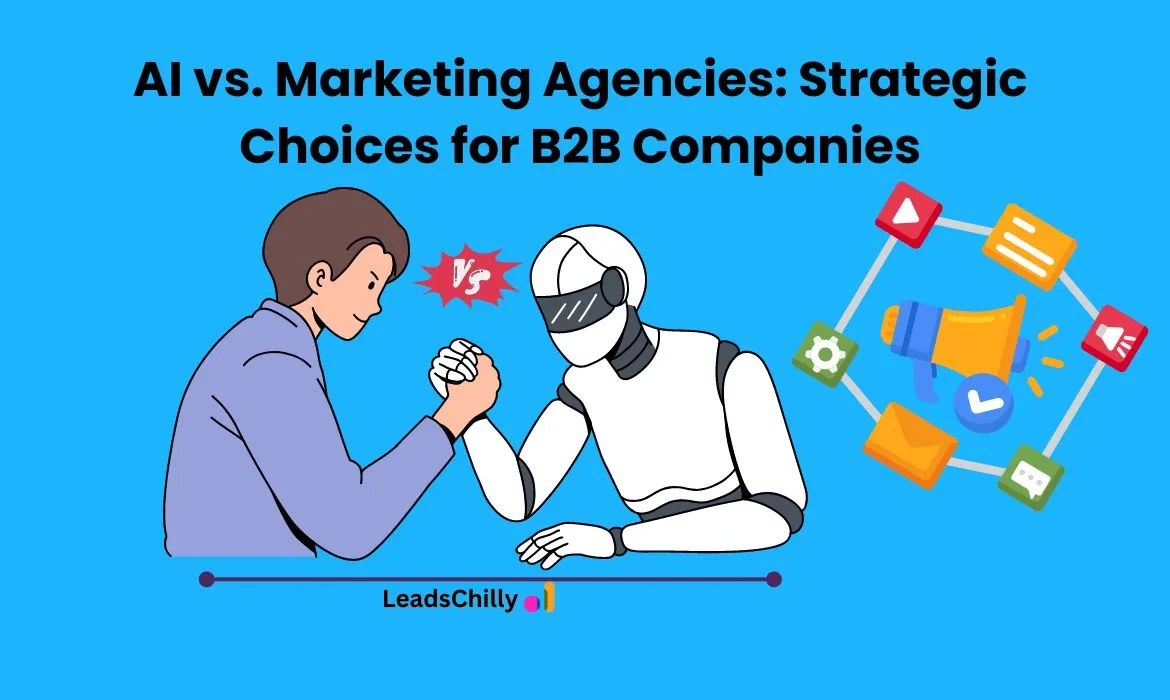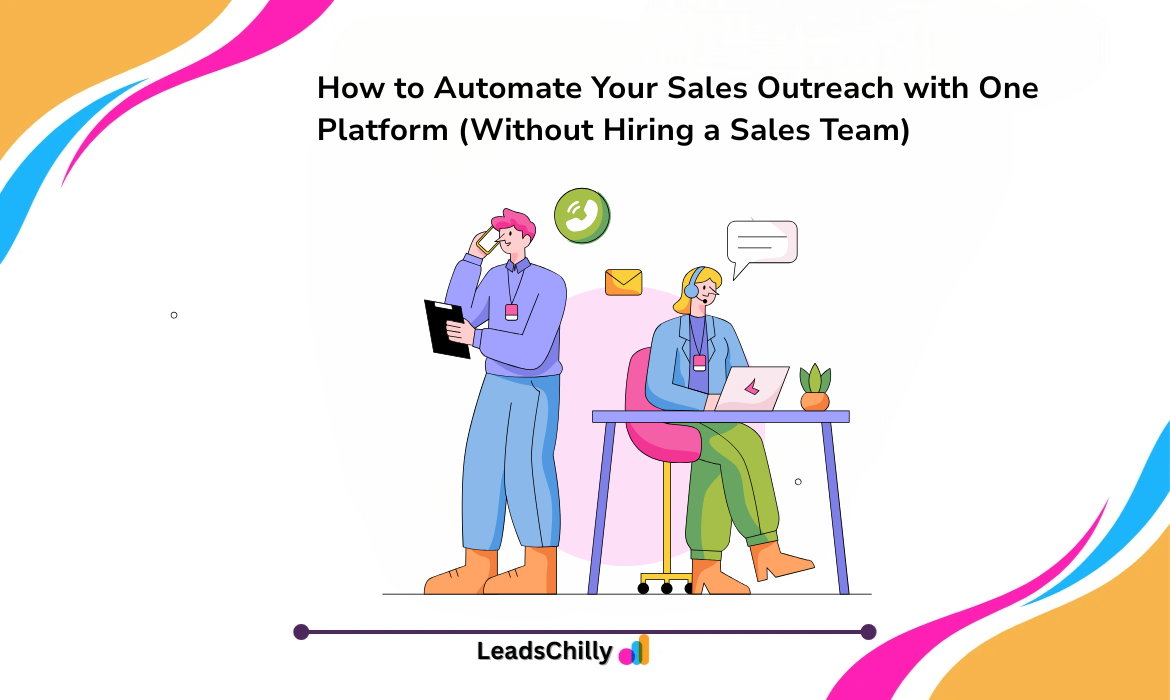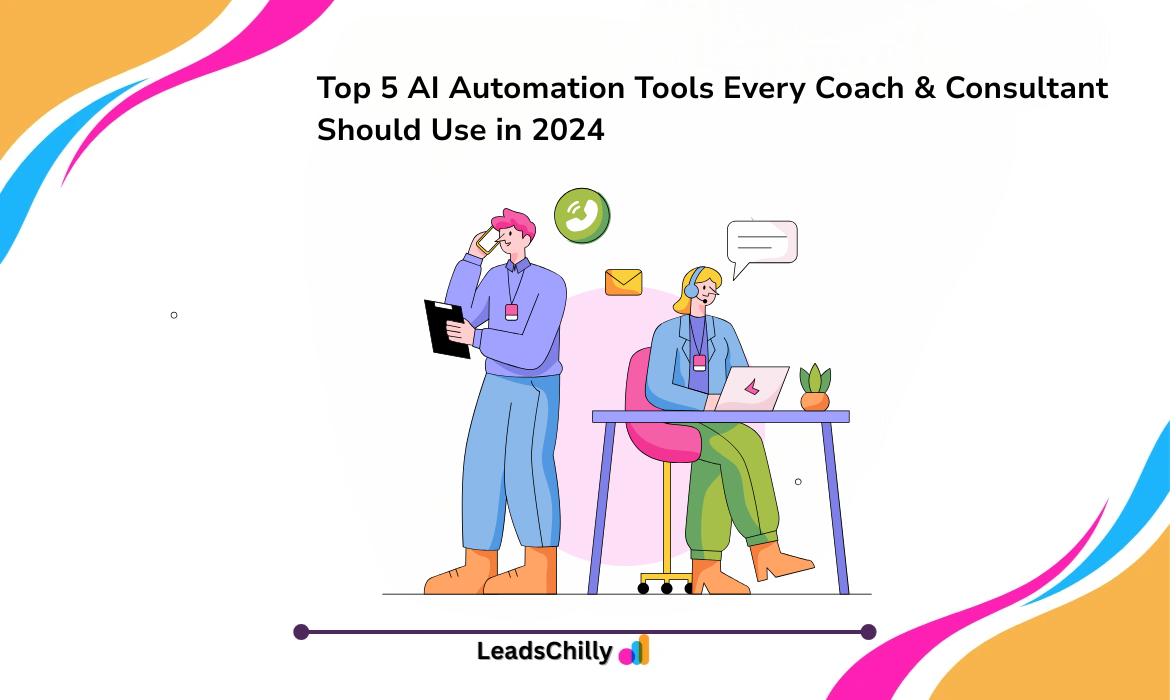Imagine you’re running a business, and you want to grow fast. But now you have to make an important decision: Should you use advanced AI tools to handle your marketing, or should you hire a traditional marketing agency? Both options have their advantages, but they come with challenges too.
Experts estimate that generative AI could add between $2.6 and $4.4 trillion to the global economy. A study by McKinsey shows that about one-third of companies are already using generative AI in at least one part of their business.
But don’t worry; this doesn’t mean replacing your team with robots! Instead, more B2B companies see AI as a helpful tool that can boost efficiency. In this blog, we’ll look at AI vs. marketing agencies, comparing the pros and cons of each to help you decide which is better.
What is AI in Marketing?
Artificial Intelligence (AI) is transforming the way businesses approach marketing. AI in marketing refers to using machine learning algorithms, data analysis, and automation tools to execute and optimize marketing strategies. From personalized email campaigns to predictive analytics, AI in marketing can revolutionize how B2B companies reach their target audiences.
Benefits of Using AI in Marketing
Data-Driven Decisions
AI tools analyze vast amounts of data, allowing for smarter, quicker decisions.
Cost Efficiency
AI reduces the need for large teams, minimizing costs.
Personalization
AI can tailor content and offers to individual prospects, increasing engagement.
Automation
Routine tasks like email marketing, social media management, and customer segmentation can be automated, freeing up time for strategic initiatives.
What Do Marketing Agencies Offer?
Traditional marketing agencies provide a full suite of services, including creative design, content creation, SEO, social media management, and strategic planning. They bring human expertise, experience, and creative thinking to the table.
Benefits of Hiring a Marketing Agency
- Human Expertise: Agencies offer a human touch, creative insights, and nuanced understanding that AI tools may lack.
- Comprehensive Strategy: They provide an all-encompassing strategy, from brand positioning to executing multi-channel campaigns.
- Established Processes: Agencies often have proven frameworks and processes, reducing the trial and error phase for your marketing efforts.
AI vs. Marketing Agencies: A Detailed Comparison
|
Criteria |
AI in Marketing |
Marketing Agencies |
|
Cost |
Lower initial cost due to automation |
Higher cost due to human expertise |
|
Customization |
High personalization via data analysis |
Customization based on creativity and insights |
|
Speed of Implementation |
Fast, real-time data processing |
Slower, dependent on human resources |
|
Scalability |
Easily scalable with minimal cost increase |
Scalability depends on agency capacity |
|
Human Touch |
Limited |
High |
Which is More Effective for B2B Companies – AI or Marketing Agencies?
Deciding whether AI or marketing agencies are more effective depends on several factors, including budget, goals, and the nature of your business.
When to Choose AI?
- If you have a limited budget but need to scale quickly.
- When your marketing efforts rely heavily on data and analytics.
- If you require 24/7 operation with minimal human intervention.
When to Choose a Marketing Agency?
- If your marketing strategy requires a high level of creativity and human insight.
- When you need comprehensive, multi-channel marketing campaigns.
- If you prefer a hands-off approach where experts handle all aspects of your marketing.
Key Challenges
Using AI in Marketing
While AI in marketing offers numerous benefits, it also comes with challenges:
- Data Privacy Concerns: AI tools rely heavily on data, which can raise privacy issues.
- Lack of Creativity: AI lacks the human creativity needed for unique campaign ideas.
- Initial Setup Costs: While AI can save money in the long term, initial setup and integration can be costly.
- Dependence on Data Quality: AI’s effectiveness is heavily dependent on the quality of data it processes.
Working with Marketing Agencies
Similarly, working with marketing agencies has its drawbacks:
- Higher Costs: Agencies typically charge more than AI tools due to the human resources involved.
- Longer Time to Market: Campaigns may take longer to launch due to planning and approval processes.
- Limited Scalability: Scaling up efforts with agencies can be challenging and expensive.
How Can B2B Companies Balance AI and Marketing Agencies?
The ideal approach for many B2B companies may be to combine the strengths of both AI and marketing agencies. Here’s how:
Leveraging AI for Data-Driven Insights
Use AI tools to gather and analyze data on customer behavior, preferences, and market trends. This data can then inform the strategic decisions made by your marketing agency, ensuring that campaigns are both creative and data-driven.
Using Agencies for Creative Strategy and Execution
While AI handles the numbers, let your marketing agency focus on the creative side—developing compelling content, designing visually appealing ads, and crafting persuasive messages.
Future of AI in Marketing and the Role of Agencies
The future of marketing will likely see even more integration between AI and marketing agencies. Here are some emerging trends:
- AI Augmentation: Agencies will increasingly use AI to augment their services, offering clients data-driven insights alongside creative strategies.
- Enhanced Personalization: AI will enable even more tailored marketing campaigns, while agencies provide the human creativity to make those campaigns memorable.
- Greater Collaboration: Expect to see more collaboration between tech companies developing AI tools and traditional marketing agencies to provide comprehensive solutions to B2B companies.
How to Integrate AI into Your Existing Marketing Strategy?
Successfully integrating AI into your marketing strategy can enhance your overall approach without discarding the valuable input from marketing agencies. Here’s how you can start:
Start with Data-Driven Tools
Use AI-based tools for data analytics, customer segmentation, and predictive modeling to gain insights into customer behavior and market trends.
Automate Repetitive Tasks
Employ AI to automate repetitive tasks such as social media posting, email marketing, and basic customer service to free up time for more strategic activities.
What is the Impact of AI on the Future of Marketing Jobs?
The integration of AI into marketing raises questions about the future of marketing jobs. While some fear job loss due to automation, there are also opportunities:
Job Evolution Rather than Job Elimination
AI may change the nature of marketing jobs, shifting roles from routine tasks to more strategic and creative responsibilities.
New Roles and Skills
AI creates demand for new roles, such as AI specialists, data analysts, and machine learning experts, encouraging continuous learning and adaptation.
Conclusion: Choosing the Right Path for Your B2B Strategy
When it comes to choosing between AI and marketing agencies, the best choice depends on what your business needs. Some companies may find that AI is the fastest and most cost-effective way to scale. Others might benefit more from the creative and hands-on approach of a marketing agency. For many, the perfect solution might be a mix of both.
Ready to boost your B2B marketing? Sign up for LeadsChilly’s free 14-day trial and experience how our all-in-one platform can help you generate high-quality leads and drive growth!
Frequently Asked Questions
AI in marketing uses machine learning and automation tools to analyze data, optimize strategies, and personalize customer experiences.
Yes, agencies provide human creativity, expertise, and a comprehensive approach that AI alone cannot match.
AI can be more cost-effective for routine tasks and data analysis, while agencies may be better for complex, creative campaigns.
Absolutely! Combining AI’s data-driven insights with an agency’s creative strategies can offer a balanced approach.
Consider your budget, marketing goals, and whether you need more data analysis or creative direction.




Comments are closed.